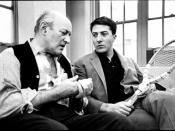Willy Loman experiences many misfortunes and adversity throughout Arthur Miller's play, Death of a Salesman. The play tells of a sixty-year-old salesman who is drifting back and forth between reality and his flashbacks. The events that would come about are no doubt grim and would help designate Willy as a tragic hero. While Willy is a tragic hero, he does not fit into Aristotle's definition of one in the traditional sense. Willy is able to bring about sympathy among the audience or reader, he has a tragic flaw, and he succeeds in achieving his own downfall.
Aristotle believe that for a character to be considered a tragic hero, he must arouse feelings of pity and sadness. Willy definitely accomplishes this in the story. As the play progresses, Willy's mental condition gradually worsens into encroaching madness. All the while, his family is able to recognize this potential problem. They are able to see through his charade and deception and offer Willy some help.
But delusional as he is, Willy continues to lie to his family that he is a renown salesman. He does this to make it so that his family would not see him as a disgrace and that he can still provide for his family. This is evident in Willy's flashbacks as he tries to sustain a sense of himself to make life worth living. He reminisces about the days gone by and would hallucinate visions of his brother, Ben. Willy, as hard working as he is, is an appalling salesman. While trying to climb up the economic ladder and to get a better job from Howard, Willy is ultimately shot down.
While a tragic hero must invoke must sorrow in the minds of the audience, he must also possess a tragic flaw. The flaw exists to bring...


